Editorial
I Grew Up Without Expectations – Ayandele

Dr Francis Ayandele worked as a foundation member of staff of the Federal Capital Development Authority (FCDA) as Chief Health Services Planner. He was in charge of River Blindness Control Programme and he also set up the Abuja Environmental Protection Board (AEPB). Here with JULIET KUYET BULUS, the octogenarian reflects on his life and times
When and where were you born?
I was born in Sepeteri, Oke Ogun region of Oyo State (Western Region) on April 26, 1938.
How are you able to tell the exact date and year?
My father was literate. He took record of the dates of births of our kindred. My parents could read the Bible in Yoruba.He took record of the dates of births of our kindred. My parents could read the Bible in Yoruba.
Which institutions and or schools did you attend?
I started my elementary education at Baptist Day School, Sepeteri and the highest class then was standard four. Then I proceeded to Native Academy School, Kisi in 1953 where I spent two years and came top of my class. After the elementary school, I went to Teacher’s Training College in Iseyin, and I worked at a tobacco company for two years. I also attended Baptist College, Iwo 1961 to 1962 for Teachers Grades 3 and 2 respectively. Things changed from then on because I knew my father did not have the capacity to support me with the responsibilities he had, but then, we are not in charge because as I had my thoughts, the Creator also had plans for me. I had already started taking tests and did not know what I was going to do with it but as God will have it, the commitment I put into sports at Baptist College, Iwo was preparing me for something better.
The missionary in charge of athletics, Dr David .L. Jates was out of the country for a year as teachers after three years were usually given the opportunity to travel home. When he got back, he was posted to Minna at Niger Baptist College and it was like a secondary school with a five-year programme. He asked of me as soon as he got back to the country because he knew me as someone who had determination and commitment as I would always stay late to practise even after other students had closed at 6pm for the day. He believed I could transfer such commitment to the students in his new school. That led to my transfer from Iwo to Minna where I also set records.
He saw I was good in academics, even as a fresh man, I displaced the senior prefect after spending just two to three months. The missionary in charge was not comfortable telling the prefect to step down for me. It was after an event, a very competitive one at that, where I finished third that he summoned the courage to tell him. From then on, I kept improving.
At a point the missionary asked me if I wanted to study in the US, he had seen how I started changing the environment, how I made my boys scout to win, built tennis court and my students wove the tennis net with quality twine. The progress he wanted was happening. The boys I trained won trophy back to back for two years. Then the final was usually played at the Ahmadu Bello Stadium. Whenever we went for inter-college sports competition which was for Teachers Training Colleges in the North, the boys excelled.
So, he gave me a list of universities in the US and I applied for two schools, both of them gave me admission, but I chose University of Louisville in Kentucky because they gave me tuition scholarship. Unfortunately, I had to delay the admission because I didn’t have money for the flight ticket. But I thank God eventually I went to the school and there I obtained B.A Biology 1970 with minors in Chemistry and Physical and Health Education (PHE).
After my undergraduate programme, I wanted to go to medical school but I had no money, I tried getting scholarship from the Western Region but was told they sponsored only those that had worked, so I proceeded to the University of Pittsburgh, Pennsylvania, in the US for graduate studies where I obtained M.Sc. in Health Policy and Management 1971, M.P.H in Epidemiology in 1972, PhD. In Health and Social Policy Research and Development 1978 in Ibadan.
Childhood and challenges you faced while growing up
I am lucky to have the parents I had, each of them lived above 100 years. My parents were good people. My father lost his father early in life so he travelled to Ogun. After he got married, he did not stay out there for so long and they eventually settled in Sepeteri for the rest of their life.
He worked as a sanitary assistant until one day he decided not to work again because of what he was seeing. I did not know that until much later, when I suffered a similar fate. Then I realized that I must have been his true son (he laughs). He left the public service in 1960 and joined his brother on the farm. My mother was very industrious, she was into soap making (soda) was quiet and avoided trouble.
Growing up was good because there was collective responsibility for the upbringing of a child and any child who misbehaved was called to order. My parents married late because when they wanted to, my father’s elder brother was not yet married and my father had to go look for him where he resided, brought him home and he eventually got married, this paved the way for my parents to get married and they moved to Ogun, Abeokuta and Ikorodu before relocating back to Sepeteri. Around 1944, a friend of my father came for a visit and told my father I had to go to school, and at that time I was at the farm with my uncles. I was about six years, my father never thought of it. He earned salary and it was coming regularly, I did not suffer. The advice was not easy for my father to take because I was sort of representing him on the farm but again, this particular friend was close to him and he obliged.
He took the advice and he never regretted it. Education was not strange then because I had two cousins who were already in school. I had good intelligent classmates and three of us would always end up getting from first position to third. It was not difficult going to school. Those days before one was allowed to go to school, there was test of maturity, the hand must be able to go across the head touching the ear and if the hand could not do this, then such a person was not ready for school. I think the missionaries brought this because they got involved in the education. It was the test for the youngest as they were admitting much older people.
I grew up with my cousins, we had a disciplined upbringing. In school I was interested in sports and there was no school I attended, that I was not in the first eleven. I set records and some of those records in football have not been replaced to this day and my school days was quite pleasant.
Managing life and school was a challenge because there was nothing unusual with farming. I grew up without expectation, we lived life based on the expectations of the society unlike today, children expect they should be pampered and they make comparisons with age group. The culture and our values have been distorted across the nation. Challenges were accepted as being normal and every challenge I faced was as a result of my ‘rascality’ because there were times I fell from my bicycle and got injured. Challenges today were not challenges those days as they were just the norm though I know my father had challenges bringing us up due to our size. When a child passed by elders without greeting or prostrating well they would identify the child’s parents, report the child to the parents as disrespectful. So every child had to fall in line to avoid being tagged disrespectful.
How did you get to work as a pioneer staff of FCDA?
One of the courses I took in the US centred on Urbanisation and decongesting London. I suggested same to be done for Lagos in a term paper titled: ‘the need to move the Administrative Seat of Power’. That was in 1975 thinking it would go to either Abeokuta or Benin. Before then, I read the book ‘Garden City of Tomorrow’. I believe it was because of the suggestions I made in that paper that I was employed by FCDA.I suggested same to be done for Lagos in a term paper titled: ‘the need to move the Administrative Seat of Power’. That was in 1975 thinking it would go to either Abeokuta or Benin. Before then, I read the book ‘Garden City of Tomorrow’. I believe it was because of the suggestions I made in that paper that I was employed by FCDA.
On one of my visits to Nigeria a friend told me there was an ongoing project and I thought I should apply, when I did, I was invited for an interview and I reported in Lagos. They flew me from Lagos to Enugu to Makurdi, Jos and I ended up in Kaduna where I was lodged in a hotel for two days before the interview. During the interview, I gave the chairman of the interview panel the term paper I wrote and I believe going through the paper exposed him to the plans I had.
After the interview I was asked if I had any questions for them and it was a yes. While in the hotel, I laid my hands on the logistics of the city’s development project, told them I noticed they were planning a two bedroom flat for a family of four that I wanted to know what it meant because it seemed they were trying to transfer Lagos to Abuja.
This shocked them and they told me I did not know Lagos, that if I did, I would know eight people slept in a room there. But I saw they did not understand the problem. I painted a scenario for them where a family of four which included children of both sexes staying in the same room. I asked them what would happen when they were older and needed privacy. This means they both deserve a room each with their parents sharing one. I told them that in Africa, people visit unannounced, so the minimum for the family of four should be a three-bedroom flat.But I saw they did not understand the problem. I painted a scenario for them where a family of four which included children of both sexes staying in the same room. I asked them what would happen when they were older and needed privacy. This means they both deserve a room each with their parents sharing one. I told them that in Africa, people visit unannounced, so the minimum for the family of four should be a three-bedroom flat.
For me it was not about the employment, but the concern I had for the country. I also told them I observed they were planning to have fire stations but the fire station I saw so far are all located in down town areas. I told them down town areas is where one finds quality structures that cannot be easily subjected to fire destruction that places with likely fire incidences are residential areas and they would expect the fire services to get to such places within three to five minutes which is not possible.
My friend had told me to apply for principal health services but when they heard my contributions they knew I was more than the level and they asked me what the position I was applying meant and I said, a person in charge. They said no, that the position was four, five or sixth place in the hierarchy within the system. I told them I was coming to influence their policies and cannot be in a level where I would not affect the policy.They said no, that the position was four, five or sixth place in the hierarchy within the system. I told them I was coming to influence their policies and cannot be in a level where I would not affect the policy.
But I looked at it, if they had someone more qualified than I am, then for the sake to participate in the project, I will take the second position. At worst if they even had two people more qualified, I would join as number three in hierarchy.
I told them it was not about the salary because compared to where I was working in the US, I didn’t think they could pay me what I got there. They told me they would think about it.
Eventually I was employed and I was in charge of River Blindness Control Programme. We had consultants from the University of Ife and Ibadan. I remember when I reported to start work, for six months I did not know where to collect my salary from and they were returning it to the treasury every month.
How was life in the public service?
I enjoyed my working life though most times it was difficult with some of the departments, but generally everyone knew I was efficient and I was too efficient for the system. It got to a point I had to protect my integrity. Because I could not involve myself with what some people were doing, I was thrown out of the system.
By that time, I had just been promoted to Assistant Director, but because I said no to tarnishing my reputation, I was thrown out. I told the Director then that if it came to that, there is land where I come from and I would go back to the farm. At the end of everything I was advised to leave, I did.
When I left, I was engaged in little things to carry on with life. I began a waste management firm with just a tipper and for nine years I was doing the business. I noticed that the city was messed up, I wrote a proposal to the government to establish the Abuja Environmental Protection Board (AEPB).
I later joined the Ministry of Environment and was working with them on Environmental Impact Assessment. The director of the agency did all the paper work of the organisational structure. In 1998 the minister then, called and said they were told that I wrote about the environment and he wanted to know what was wrong with AEPB. I told him I did not know what they were doing but I knew what they were supposed to be doing.
He told me to write a paper on what they should be doing and I accepted and told him to give me 48hours. In about 24hours, I felt the paper was ready so I called to tell the minister the paper was ready. That was how I was engaged in a contract to set up the AEPB. I was there for about five years from 1999 to 2003.
Was your career path accidental or deliberate?
It was not accidental because my father was a sanitary assistant and that became part of me. I wanted to major in Physical and Health Education but it did not happen as it became a minor and I majored in Biology. I would have ended up in sports council or something related to the course. At a point I had applied for medicine but was given dentistry and having done courses on public health I felt focusing on the mouth was not acceptable.
What roles did you play in FCDA?
I was a member of Executive Management Committee of the FCDA because I was heading my own division which was public health and environment. I love writing and was called ‘Dogon Turanci’. When you put your ideas in the air without writing it down, anyone can blow anything and it is gone but when it is put down, if anyone has a contrary idea they should as well put it down. We have things to look at and compare but many Nigerians prefer just talking. At the end of the day they are dependent on the capability of the secretary. Occasionally the director called me to ask of certain things I said and if he was referring to someone else, I simply asked if the person said it in writing and the response was always no, then I would tell him to tell them to put the observation in writing. If we cannot resolve it, we send it to someone who can.
On the day of my interview, some people wondered why they would need a Health Services Planner since they were still in Lagos. This discussion was under a tree, I said to them, until they damage the city before they need one as they had no idea what it meant. I wrote and said to avoid messing up the city, mini towns should be started in the south, east, west of the territory so that the big crowd coming in would choose where to stay, then work at city centre and going back to their respective places of residence. I made these observations so that the city does not suffer.
The idea of Nyanya was for it to be a labour camp for workers and contractors. It was a temporary arrangement which was to be destroyed later but they ended up selling it to individuals.
One day I went to Karu to see someone, the traffic I saw on the way was terrible, I spent almost two hours in my car. That is the pain people go through, leaving their homes as early as 5am and getting to the office at 7am, take a nap before work starts.
I criticized the design of the first 200 Nyanya houses, this I did in writing. We wanted to have various categories of buildings but the pace was too slow for the influx of people and when the movement from Lagos to Abuja became a decree, we did not have enough time to plan for the influx and so some flats were given to civil servants and that kept some people from bringing their families from Lagos for quite some time.
The first 200 houses in Abuja is what is called Area1 section1 and part of it is section 2, these started from April 1980. One bedroom was for junior staff and we did not start thinking of private sector housing on time, in any case no private sector was willing to come to the bush to invest, and government could not do everything. The bulk of the decision making body of the FCDA could not see the problem, only very few people could and it was a helpless situation.
When did you start work?
I became a pupil teacher in 1955 and incidentally it was the beginning of free primary education in the Western Region under Awolowo. So I started work at 15 after obtaining my first school leaving certificate. In this present age, if anyone is to work at this age, it would be tagged child labour (he laughs).
It amazes me to see a young man in his twenties still depending on his parents. I left home at the age of 13 and paid my fees for two years, my father had no reason to give me anything as I had started fending for myself and planned my life. At the Baptist College, we were being paid 52 pounds per annum. I wanted to study Fine Arts at the Ahmadu Bello University (ABU) Zaria, before I got admission to study in the United States.At the Baptist College, we were being paid 52 pounds per annum. I wanted to study Fine Arts at the Ahmadu Bello University (ABU) Zaria, before I got admission to study in the United States.
I came to Abuja with a big idea hoping we would get it right, believing the health services would get it right like we had in most countries. That was the reason I felt I should come back to Nigeria to work for a couple of years after my first master’s degree before going for the doctorate.
So I came home, went to Lagos and met with a doctor heading a particular ministry of health, he looked at my qualifications and wanted to employ me but there was no provision in the federal budget. I spent about four months in Nigeria and my employers in the United States were already calling to find out if I would be returning to them. Even though there were no communication facilities like what we have now, the post office was efficient and I kept writing them and I eventually went back. I was involved in about three jobs and I worked at the Department of Public Welfare (DPW) in Western region office, Pennsylvania then the Department of Health where I was in charge of sickle cell anemia programme. The DPW was concerned with reintegrating people living with disability into the community. It was an interesting exposure considering the fact that disabled people are not cared for here in this country.
What presently occupies your day?
I have my own little company and we are into consultancy. Though in Nigeria one could be a contractor and a consultant. This is how I am able to survive.
Where were you in 1960 during the country’s independence?
I was a headmaster. By 1958 I had finished the grade 2 teachers training and was posted to head a school in Igboho. I was already teaching when the Queen of England came to Nigeria. In 1960, I had taken examination to attend Baptist College.
What was your experience during independence?
Everyone was happy. The 1959 election which ushered in independence had mistrust all over but because everyone wanted independence, nobody bothered to raise issues that much. We heard things like ‘ba ko daya’. There were only three regional political parties NCNC, AG, Northern People’s Congress. Independence was an interesting and exciting period for all there was no interference and movement was free, government was government and Nigerians were not looking for any public system to help them. It is only now that we have higher level of resources and population growth with value system falling apart and it is safe to say we are floating.We heard things like ‘ba ko daya’. There were only three regional political parties NCNC, AG, Northern People’s Congress. Independence was an interesting and exciting period for all there was no interference and movement was free, government was government and Nigerians were not looking for any public system to help them. It is only now that we have higher level of resources and population growth with value system falling apart and it is safe to say we are floating.
The larger population is getting poorer, so anything that is dangled in front of them, they jump at. Nigeria was a better place, fewer population, freedom of movement, greed was not conspicuous, there was fear of God and of course family values controlled the behaviours of people.
Did you have any expectations during independence?
I do not think there was any expectations. The average Nigerian was not looking for government to do anything for them, they just needed representation for public services and the system was manageable and responsive at that time because the people in office were obedient ‘servants’ which was how letters were signed then. But now the driver or messenger in the office do not regard themselves as servants. The director does not see himself as a servant not to talk of the permanent secretary or minister. We just assumed that life would go on.
In 1960, I was 22year old and it was good enough an age to tell you how it was. There was no pressure or exposure for those of us in rural areas. The problem we have now is that the public system is not working and public funds are cornered, the civil service has been destroyed.
When I went back to join the system, it was when Murtala Mohammed was sacking people through the phone and security in the civil service became distorted. When Obasanjo was president there was a period they were talking about downsizing and that heightened insecurity as people were no longer sure of their future on the job so they could not see themselves as being accountable totally to the public without being first and foremost accountable to themselves.
It brought instability to the public service and it is getting more difficult to restore. The younger ones in the system emulate their bosses and it is difficult to reorientate them as they have seen the ‘benefits’. We are now in trouble as a country because it affects all and there is no way politicians will have access to public funds without the cooperation of public servants. They are the ones who move files, write lies in memos to steal the monies and this is where we are today.
My first time in Port Harcourt was by train in 1961 and it must have taken one and a half to two days but I came back by road via Onitsha and there was no bridge. I had to take a ferry to Asaba.
What should the government do to assist the aged?
Probably, it is possible we have resources for welfare services. In advanced countries, their systems know of people’s existence through registration but we do not have such in this country. We need to be honest with our population because I was a census inspector in 1963 and I knew the population of that district though I do not know what they call it till this day. How much has changed and how many generations? I believe we are not up to the official population used but because we benefit from the false population, governance is difficult because there is mutual distrust all over.
I do not think the programme for the aged will work because If money comes in for the aged at the end of the day, they will be left with nothing. Besides, African’s take care of their aged though some African’s have begun the old people’s home. I have seen the aged collapsing on verification queues to collect their pension. There are instances where one is dead and those in charge of payment do not report this, they rather keep collecting the money.
Any humanitarian programme government starts, before it gets down to the intended beneficiary, it has been depleted. One cannot run a humanitarian programme when there is no conscience.
Do you have any regrets in life?
When I look back and forth, I know I have been fortunate and that is why my slogan is ‘we are not in charge’ and it is properly anchored, I believe in the statement and also believe I am connected to the person in charge.
This is not a statement where one stays idle and expects manna to fall from the sky. The level of profit is not commensurate with the level of input because the power that be already guided what one’s benefit will be in any effort made and it is just to have the connection and make the effort.
When it does not yield the desired result, one should not bury their head in crime. Keep trying as it is not by wisdom. Earlier in life I was a photographer, an artist and all these through apprenticeship for two years and I graduated. I do not regret taking my stand in the public service though some people who find themselves in my situation would have ordinarily regretted losing their jobs and wishing they went along with the system. Most people know they stole the monies and houses they are living on. They live with this burden daily but those of us that followed our conscience are living free today. Humanity demands we be fair to fellow men and that always guides my action.
Advice to the younger generation?
Success is an individual definition as there is no single formula to success. If there was, everyone will adapt it. The younger generation should avoid cutting corners because hard work and diligence pays.
YOU CAN SEND US UR NEWS AND PRESS RELEASE TO tracknewsng@gmail.com or send it to our WhatsApp Numbers 07010000762, 08067225022
-
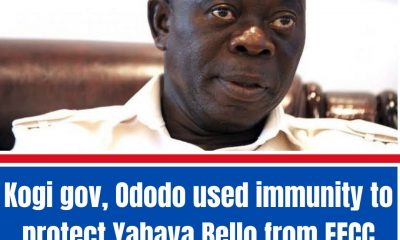
 Politics5 days ago
Politics5 days agoKogi gov, Ododo used immunity to protect Yahaya Bello from EFCC arrest – Oshiomhole
-
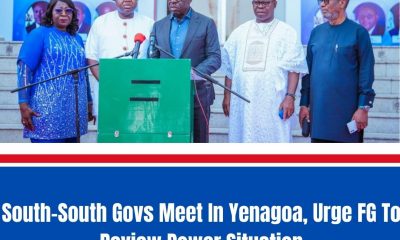
 Politics4 days ago
Politics4 days agoSouth-South Govs Meet In Yenagoa, Urge FG To Review Power Situation
-
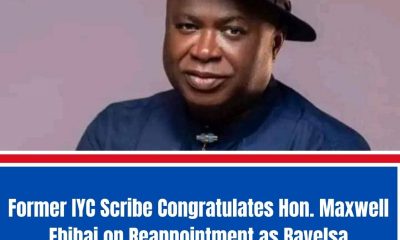
 Politics4 days ago
Politics4 days agoFormer IYC Scribe Congratulates Hon. Maxwell Ebibai on Reappointment as Bayelsa Commissioner for Finance.
-
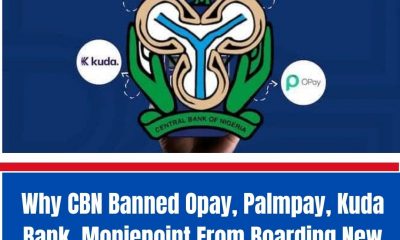
 Business4 days ago
Business4 days agoWhy CBN Banned Opay, Palmpay, Kuda Bank, Moniepoint From Boarding New Customers
-

 Entertainment5 days ago
Entertainment5 days ago‘Disrespectful’ – Mr Macaroni slams Wizkid for shading Don Jazzy
-
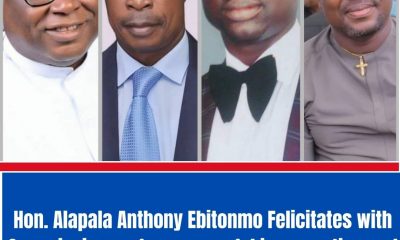
 Politics4 days ago
Politics4 days agoHon. Alapala Felicitates with Commissioners for successful inauguration and thank the governor for their appointments.
-
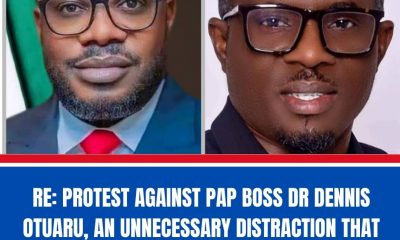
 Niger Delta4 days ago
Niger Delta4 days agoRE: PROTEST AGAINST PAP BOSS DR DENNIS OTUARU, AN UNNECESSARY DISTRACTION THAT SHOULD NOT BE TAKEN SERIOUSLY.
-
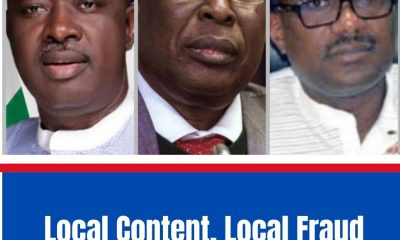
 News2 days ago
News2 days agoLocal Content, Local Fraud





